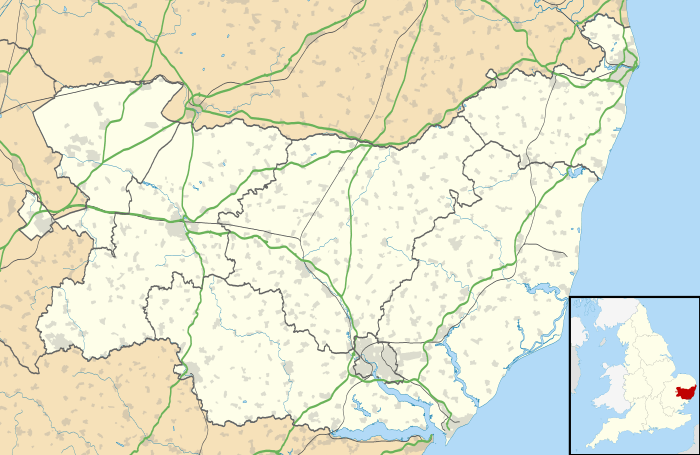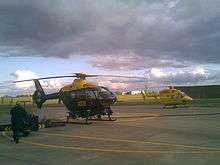Wattisham Airfield
| Wattisham Airfield Wattisham Flying Station  | |||||||
|---|---|---|---|---|---|---|---|
| Wattisham, Suffolk | |||||||
 EGUW Shown within Suffolk | |||||||
| Coordinates | 52°07′37″N 000°57′21″E / 52.12694°N 0.95583°ECoordinates: 52°07′37″N 000°57′21″E / 52.12694°N 0.95583°E | ||||||
| Type | Army Air Corps airfield | ||||||
| Site information | |||||||
| Owner | Ministry of Defence | ||||||
| Controlled by | British Army's Army Air Corps | ||||||
| Site history | |||||||
| Built | 1913 | ||||||
| In use | 1913-Present | ||||||
| Battles/wars | War in Afghanistan (2001–present) | ||||||
| Airfield information | |||||||
| Identifiers | ICAO: EGUW | ||||||
| Elevation | 87 metres (285 ft) AMSL | ||||||
| |||||||
| Sources: World Aero Data[1] | |||||||

Wattisham Airfield (ICAO: EGUW) is the biggest centralised operational Army Airfield in the UK, located next to the small village of Wattisham in Suffolk, England. It is home to 3 Regiment Army Air Corps and 4 Regiment Army Air Corps. They are part of 16 Air Assault Brigade, whose headquarters is at Colchester. They fly the Westland WAH-64 Apache, as well as the Westland Lynx helicopters.
Also located at Wattisham is No 7 Aviation Support Battalion REME with a helicopter repair facility with worldwide capability, and 132 Aviation Supply Unit Royal Logistics Corps. The RAF maintains a presence at the airfield with the Brigade Parachute Squadron RAF.
Apart from the military, the police helicopter unit for Suffolk Constabulary also operates from Wattisham as well as the Anglia Gliding Club[2] (which, in fact, is the oldest serving member of Wattisham, having been there as a RAFGSA club when the RAF occupied). Also resident is No 1287 Sqn, Air Training Corps.
The airfield covers a site of 1,072 acres (434 ha). There are 2,000 troops stationed on site with 600 houses for married personnel between Wattisham, Hadleigh and Ipswich. There are 300 HGVs, 200 Land Rovers, over 40 military helicopters and the Suffolk Police Eurocopter as well as casual access for 2 Air Ambulances.
There is a museum[3] on site which tells the history of the airfield and this is open on Sundays during April to October.
Operational units
- Army Air Corps
- 3 Regiment, Army Air Corps
- 653 Squadron (Station)
- 662 Squadron
- 663 Squadron
- 4 Regiment, Army Air Corps
- 654 Squadron (Disbanded)
- 656 Squadron
- 664 Squadron
- 3 Regiment, Army Air Corps
- Royal Logistics Corps
- 132 Aviation Supply Unit
- Royal Electrical and Mechanical Engineers
- 7 Aviation Support Battalion REME[4]
- Royal Engineers (8 Engineer Brigade, 12 (Force Support) Engineer Group)
- Headquarters 20 Works Group Royal Engineers (Air Support)
- 533 Specialist Team Royal Engineers (Airfields) (STRE)[5]
- Headquarters 20 Works Group Royal Engineers (Air Support)
History
Wattisham Airfield has had a long and distinguished history. First opening in April 1939 the airfield was used by the RAF before being lent to the United States Army Air Forces in 1942. After the Second World War Wattisham became one of the UK's front-line air force fighter airfields during the Cold War with aircraft on Quick Reaction Alert on a rotational basis with other UK fighter stations.
Wattisham used to house 'B' Flight, 22 Squadron Royal Air Force with its Search & Rescue Sea King helicopters, until the privatisation of SAR provision in 2015, which led to 22 Squadron standing down. The closest SAR base under the new Bristow Helicopters contract is Manston Airport in Kent.
References
- ↑ Airport information for EGUW at World Aero Data. Data current as of October 2006.
- ↑ Anglia Gliding Club
- ↑ Wattisham Airfield Museum
- ↑ "7 Aviation Support Battalion (Official Website)". Retrieved 2017-08-07.
- ↑ "An introduction to...20 Works Group Royal Engineers" (PDF). Wittering View. Lance Publishing Ltd.: 18 Spring 2015.
External links
- Wattisham Airfield by Wattisham Aviation Society
- About the airfield at controltowers.co.uk
- History of Wattisham
- Another history